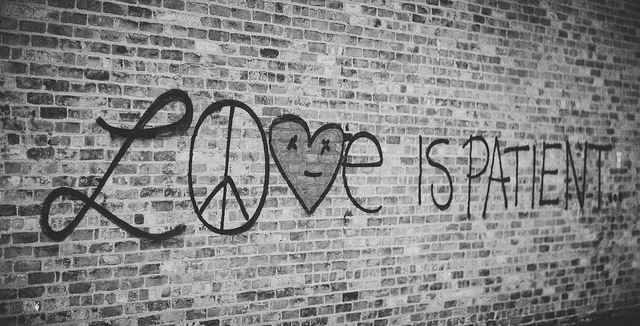I was afraid I didn’t know what love was—and as a married woman, that feeling scared me.
So, like any resourceful millennial, I Googled it.
That was foolish.
The word “love” in a Google search generated 8,130,000,000 results, while the question, “What is love?” generated a comparatively paltry 498,000,000 results.
When Google failed, I started to survey the matter, asking my friends, my mentor, and my husband—who offered the following:
“Imagine a sunrise, but happy, warm, fuzzy feelings are rising within you, instead of a cosmic event that is an artifact of Earth’s rotation,” he said.
Poetic, to say the least. But I also thought it was limited. I know that love takes practice—it’s not always easy and pleasant. Love does not actually always feel “warm and fuzzy.”
This caused me to broaden my question to: “How do people from such different belief systems, upbringings, and backgrounds engage in a feeling we all seem to share? Can there be universal love?”
The most authentic and universal description of love I found is from the New American Bible (Revised Edition), in a passage I believe gives us all a common language to understand and practice the complex thing we call love.
This biblical passage, albeit out of its biblical context, isn’t dogmatic or theological—at least not as I read it:
“Love is patient, love is kind. It is not jealous, it is not pompous, it is not inflated, it is not rude, it does not seek its own interests, it is not quick-tempered, it does not brood over injury, it does not rejoice over wrongdoing but rejoices with the truth. It bears all things, believes all things, hopes all things, endures all things. Love never fails.” ~ 1 Corinthians 13: 4-8
While culturally it’s often used to describe romantic love, the biblical passage in fact asserts love’s universality and does not qualify the type of love being described.
While love manifests differently depending on the context and environment in which it’s experienced, the root, I believe, is the same.
The love I have for myself, my husband, my clients, my family (both biological and chosen), my pets, my friends, my coworkers, and strangers are all felt, expressed, and experienced differently, but they all share the same point of origin.
That point of origin is agape, a Greco-Christian term referring to the highest form of love or charity—a type of love eloquently expressed in this biblical passage. Agape shouldn’t be confused with philia—brotherly love—because agape embraces a universal, unconditional love that transcends and serves regardless of circumstances.
I answered my question, in part. Yes, there is a universal love that can be practiced. But how?
To me, love isn’t a feeling. Rather, love is a collective set of behaviors. Culturally, we often limit our conversations about love to describing it nearly exclusively as an emotion. And it is, to an extent—a complicated mix of emotions. But to quote John Mayer, “Love is a verb.”
I’m not even religious, and yet I find choosing to behave with unconditional kindness and forgiveness, to give without expectation for return, to accept others without judgment, to act with patience and understanding, to be modest and humble, to celebrate truth and honesty, and to have respect and commitment are all simple ways to practice universal love.
Unconditional, universal love—agape—is a daily, mindful decision to act in these particular ways, regardless of whether we consider ourselves Christians or not.
It is a decision to slow down or mitigate our reactivity to negative emotions, to not be consumed with jealousy or impatience, to not be self-centered.
To live simply, mindfully, and lovingly, we can hug ourselves, meditate or pray, practice good self-care, downsize, set boundaries, forgive ourselves and others, and use positive affirmations.
We can focus on our strengths, our abilities, and our admirable traits—as well as those of others.
We can let go of all harsh judgments, comparisons to others, and self-hatred. We can give of ourselves in the service of others. We can practice gratitude and embrace ourselves through the process of self-discovery in all of its possible manifestations.
We can surrender.
I certainly feel happier, lighter, more productive, and softer acting in these ways.
While this may not be an exhaustive list of behaviors, this is at least the foundation of how we can start to practice this radical, universal love called agape—a radical love that extends to ourselves first.
Namaste.
~
~
Author: Genevieve Gellert-Ilg
Image: Guian Bolisay/Flickr
Editor: Callie Rushton
Copy Editor: Leah Sugerman
Social Editor: Yoli Ramazzina









Read 0 comments and reply